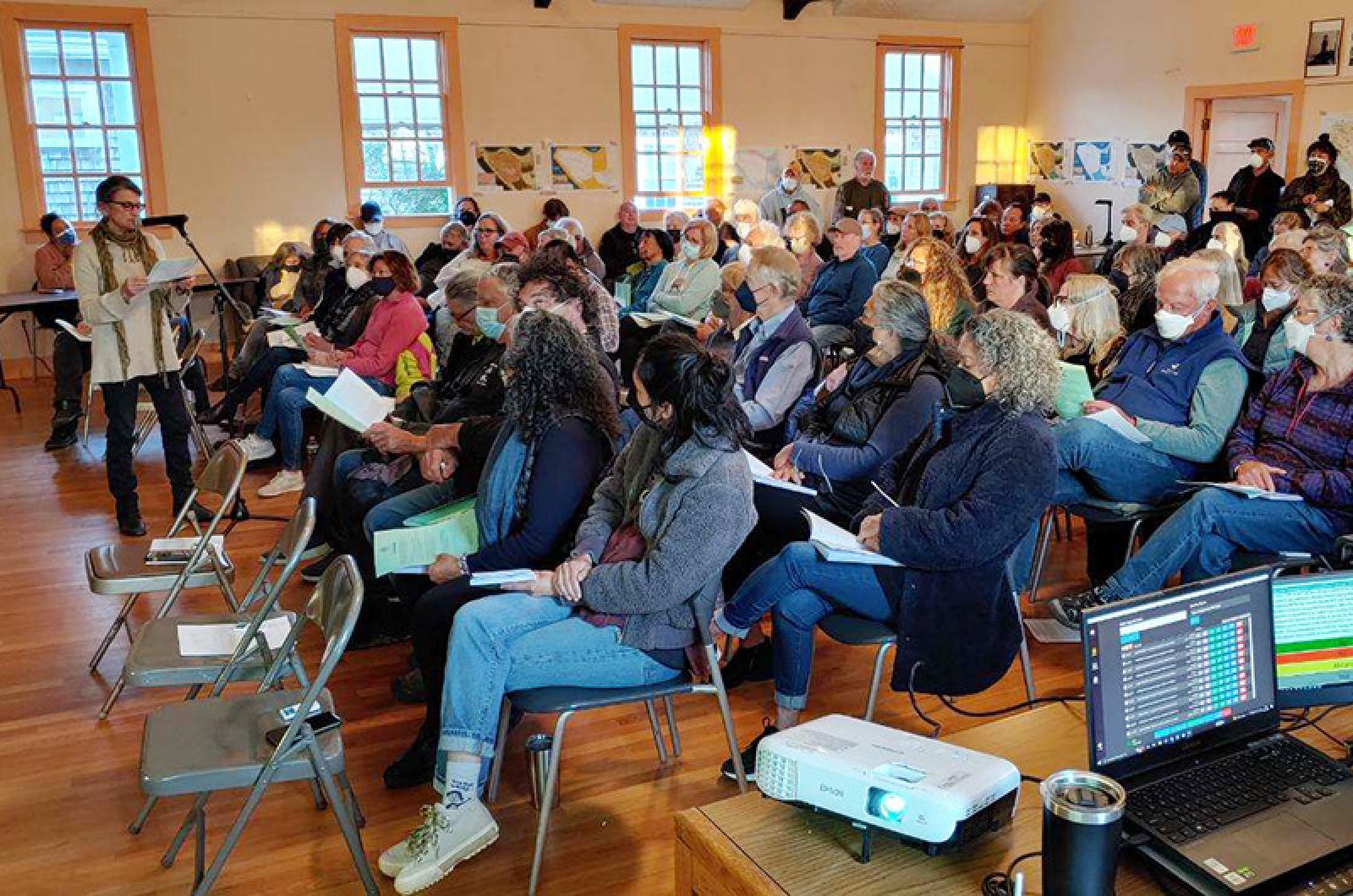Aquinnah voters closed out the Island political season with a bang Tuesday night, packing the old town hall for their annual town meeting and joining five other Island towns in handing resounding approval to the Martha’s Vineyard Housing Bank.
“At this point we are all aware of the severity of the lack of year-round housing,” said Mitzi Pratt, a voter and member of the coalition that has led the charge this winter to create the housing bank. “Think nurses, teachers, first responders.”
It was the last annual town meeting of the year on the Vineyard. Longtime moderator Michael Hebert presided over a meeting room where tables became seats and extra rows of chairs were put out at the last minute to accommodate the overflow crowd. A total of 83 voters turned out.
The annual town election, including a companion housing bank ballot question and a race for the board of health, was Thursday. Election results will appear online at vineyardgazette.com.
A $5.8 million annual town budget was approved with little discussion at the outset. But the trial debut of a new electronic remote voting system caused chatter. Voters were each handed a small clicker as they entered the meeting, equipped with buttons to convey yea and nay votes and abstentions. For each article on the warrant, voters took a few seconds to cast their vote before final tallies were displayed on a large screen. (Later in the meeting a warrant article to spend $6,000 on the new system was approved.)
A package of articles that would launch the first steps to establish a set of town bylaws requiring new construction and major renovations to be all-electric was ultimately approved, but not before discussion and debate.
“Climate change is happening faster than ever expected,” said Bill Lake, who led the effort to craft the bylaws. “The effects of climate change are also worse than ever before.”
A nearly identical set of bylaws were approved in West Tisbury at its annual town meeting last month. All still need approval from the state legislature.
On Tuesday, voter Elizabeth Witham raised concern about whether the bylaws would put an unreasonable cost burden on Aquinnah homeowners.
“I’m really worried about pricing people who are building homes in this town out,” she said. “It just seems like a huge thing to do.”
The design phase for a long-planned project to renovate the town hall and town-owned comfort station at the Cliffs will get under way after voters agreed to spend $200,000 for the work and also exceed the provisions of Proposition 2 1/2, the state-mandated tax cap.
Presenting preliminary plans for the new comfort station, project architect Ned Collier explained that protecting views are a high priority.
“From the retail shops it’s all but invisible,” he said, describing the new location for the building.
For the town hall complex, Mr. Collier detailed a plan to connect the two existing buildings by moving the police station to the current location of the town offices and create a new office annex. He emphasized that the plans are preliminary.
“What we’ve done is really pre-design,” Mr. Collier said.
Select board members urged voters to approve the money, noting the poor condition of the buildings.
“It will be so nice . . . when it’s not falling down, when we’re up to standards and safety codes,” board member Juli Vanderhoop said.
The final vote was 59-18 in favor of the article.
Voters also easily agreed (48-7) to borrow $400,000 to put toward four affordable apartments planned for behind the town hall, and approved a later article allowing the town to transfer the land for the project to Island Housing trust for the development. The borrow
ing will ultimately be paid back using Community Preservation Act funds.
A number of regional and CPA spending items won easy approval, including:
• 35,852 for highway construction and improvements;
• More than $30,000 for an emergency generator at Chilmark School and roof repairs at the West Tisbury School;
• $21,300 for the town share of a roof restoration project at the Oak Bluffs Tabernacle.
Voters also agreed to spend $3,000 from the waterways fund to remove codium from Menemsha Pond.
In the only article that failed, voters balked at spending $26,000 to install new parking kiosks in the municipal lot near Moshup Beach.
Select board member Tom Murphy said the kiosks were intended to collect additional revenue during the shoulder season, when a parking attendant is not present at the lot.
“The intent was to capture the business that’s up there in September, October and maybe in May,” Mr. Murphy said, adding that the town could potentially collect thousands in additional revenue per year.
But some objected to the idea of enforcing pay parking in the shoulder season, and questioned the wisdom of allowing a $26,000 override for the work.
Mr. Murphy argued that charging for parking outside the peak season would simply be an extension of a well-established practice.
“We charge people in June, July and August,” he said. “I don’t think people think that’s not hospitable.”
The vote was 25-13 against the article.








Comments
Comment policy »